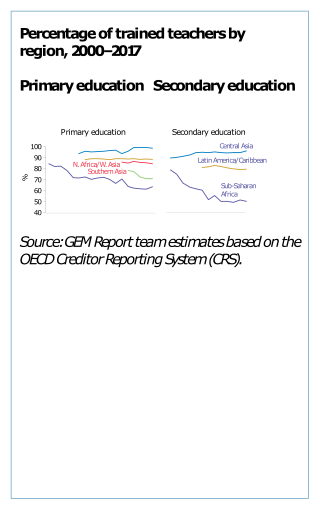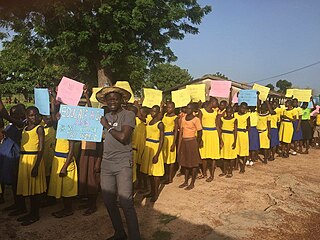
Pedagogy, most commonly understood as the approach to teaching, is the theory and practice of learning, and how this process influences, and is influenced by, the social, political, and psychological development of learners. Pedagogy, taken as an academic discipline, is the study of how knowledge and skills are imparted in an educational context, and it considers the interactions that take place during learning. Both the theory and practice of pedagogy vary greatly as they reflect different social, political, and cultural contexts.

Peter McLaren is a Canadian-American scholar and is known as one of the leading architects of critical pedagogy. He is known for his writings on critical literacy, sociology of education, cultural studies, critical ethnography, and Marxist theory.
Culturally relevant teaching is instruction that takes into account students' cultural differences. Making education culturally relevant is thought to improve academic achievement, but understandings of the construct have developed over time Key characteristics and principles define the term, and research has allowed for the development and sharing of guidelines and associated teaching practices. Although examples of culturally relevant teaching programs exist, implementing it can be challenging.
Gloria Jean Ladson-Billings FBA is an American pedagogical theorist and teacher educator known for her work in the fields of culturally relevant pedagogy and critical race theory, and the pernicious effects of systemic racism and economic inequality on educational opportunities. Her book The Dreamkeepers: Successful Teachers of African-American Children is a significant text in the field of education. Ladson-Billings is Professor Emerita and formerly the Kellner Family Distinguished Professor of Urban Education in the Department of Curriculum and Instruction at the University of Wisconsin–Madison.

Teacher education or teacher training refers to programs, policies, procedures, and provision designed to equip (prospective) teachers with the knowledge, attitudes, behaviors, approaches, methodologies and skills they require to perform their tasks effectively in the classroom, school, and wider community. The professionals who engage in training the prospective teachers are called teacher educators.

Inclusion in education refers to including all students to equal access to equal opportunities of education and learning, and is distinct from educational equality or educational equity. It arose in the context of special education with an individualized education program or 504 plan, and is built on the notion that it is more effective for students with special needs to have the said mixed experience for them to be more successful in social interactions leading to further success in life. The philosophy behind the implementation of the inclusion model does not prioritize, but still provides for the utilization of special classrooms and special schools for the education of students with disabilities. Inclusive education models are brought into force by educational administrators with the intention of moving away from seclusion models of special education to the fullest extent practical, the idea being that it is to the social benefit of general education students and special education students alike, with the more able students serving as peer models and those less able serving as motivation for general education students to learn empathy.
Curriculum theory (CT) is an academic discipline devoted to examining and shaping educational curricula. There are many interpretations of CT, being as narrow as the dynamics of the learning process of one child in a classroom to the lifelong learning path an individual takes. CT can be approached from the educational, philosophical, psychological and sociological perspectives. James MacDonald states "one central concern of theorists is identifying the fundamental unit of curriculum with which to build conceptual systems. Whether this be rational decisions, action processes, language patterns, or any other potential unit has not been agreed upon by the theorists." Curriculum theory is fundamentally concerned with values, the historical analysis of curriculum, ways of viewing current educational curriculum and policy decisions, and theorizing about the curricula of the future.
Multicultural education is a set of educational strategies developed to provide students with knowledge about the histories, cultures, and contributions of diverse groups. It draws on insights from multiple fields, including ethnic studies and women studies, and reinterprets content from related academic disciplines. It is a way of teaching that promotes the principles of inclusion, diversity, democracy, skill acquisition, inquiry, critical thought, multiple perspectives, and self-reflection. One study found these strategies to be effective in promoting educational achievements among immigrant students.
A Jungian scholar, Mayes has produced the first book-length studies in English on the pedagogical applications of Jungian and post-Jungian psychology, which is based on the work of Carl Gustav Jung (1875–1961). Jungian psychology is also called analytical psychology. Mayes' work, situated in the humanities and depth psychology, is thought to offer an alternative to the social sciences model.
Shirley R. Steinberg is an educator, author, activist, filmmaker, and public speaker whose work focuses on critical pedagogy, transformative leadership, social justice, and cultural studies. She has written and edited numerous books and articles about equitable pedagogies and leadership, urban and youth culture, community studies, cultural studies, Islamophobia, and issues of inclusion, race, class, gender, and sexuality. Steinberg was the Research Chair of Critical Youth Studies at the University of Calgary for two terms, executive director of the Freire Project freireproject.org, and a visiting researcher at University of Barcelona and Murdoch University. She has held faculty positions at Montclair State University, Adelphi University, Brooklyn College, The CUNY Graduate Center, and McGill University. Steinberg directed the Institute for Youth and Community Research at the University of the West of Scotland for two years.
Archetypal pedagogy is a theory of education developed by Clifford Mayes that aims at enhancing psycho-spiritual growth in both the teacher and student. The idea of archetypal pedagogy stems from the Jungian tradition and is directly related to analytical psychology.

Educational anthropology, or the anthropology of education, is a sub-field of socio-cultural anthropology that focuses on the role that culture has in education, as well as how social processes and cultural relations are shaped by educational settings. To do so, educational anthropologists focus on education and multiculturalism, educational pluralism, culturally relevant pedagogy and native methods of learning and socializing. Educational anthropologists are also interested in the education of marginal and peripheral communities within large nation states. Overall, educational anthropology tends to be considered as an applied field, as the focus of educational anthropology is on improving teaching learning process within classroom settings.
Gwendolyn Cartledge is professor in the School of Physical Activity and Educational Services at the Ohio State University, specializing in methods for teaching social skills to children with and without disabilities ). Her primary responsibilities include teacher education for students with mild disabilities on. Her research and writings are recognized and cited nationally in teacher preparation programs. She has written several books and articles on these topics.
Kenneth J. Fasching-Varner formerly the Shirley B. Barton Endowed Associate Professor of Education at Louisiana State University in Baton Rouge, Louisiana is now Professor of Education at University of Nevada, Las Vegas whose ideas contribute to education and social reform. Fasching-Varner has proposed a non-developmental theory of white racial identity offering a direct counterpoint to the developmental theories of racial identity. He, along with colleagues Christine Clark and Mark Brimhall-Vargas, have written about the occupation of the academy in higher education to discuss the treatment of diversity in higher education during the Obama era. The edited volume has received praise, being awarded the Duke University Office of Inclusion and Equity's December 2012 book of the month. The volume has also received critique from the neo-conservative Manhattan group, citing that the book does not account for fiscal needs when advocating for diversity.
Carol Diane Lee is an American professor, educational researcher, school director and author. Now retired, Lee was the Edwina S. Tarry Professor of Education and Social Policy, Professor of Learning Sciences, and Professor of African-American Studies at Northwestern University. Her scholarly interests focus on the influences of culture and literacy on education, particularly among students in the African-American community. She chairs the Board of Director of the Betty Shabbazz International Charter School, an institution she helped found.
Liat Ben-Moshe is a disability scholar and assistant professor of criminology, Law, and Justice at the University of Illinois at Chicago. Ben-Moshe holds a PhD in sociology from Syracuse University with concentrations in Women and Gender Studies and Disability Studies. Ben-Moshe's work “has brought an intersectional disability studies approach to the phenomenon of mass incarceration and decarceration in the US”. Ben-Moshe's major works include Building Pedagogical Curb Cuts: Incorporating Disability into the University Classroom and Curriculum (2005), Disability Incarcerated: Imprisonment and Disability in the United States and Canada (2014), and Decarcerating Disability: Deinstitutionalization and Prison Abolition (2020). Ben-Moshe is best known for her theories of dis-epistemology, genealogy of deinstitutionalization, and race-ability.
Abolitionist teaching, also known as abolitionist pedagogy, is a set of practices and approaches to teaching that emphasize abolishing educational practices considered by its proponents to be inherently problematic and oppressive. The term was coined by education professor and critical theorist Bettina Love.
Donna Y. Ford is an American educator, anti-racist, advocate, author and academic. She is a distinguished professor of education and human ecology and a faculty affiliate with the center for Latin American studies in the college of arts and sciences, and the Kirwan Institute in the college of education and human ecology at Ohio State University.

Tyrone C. Howard is an American educator, academic, and author. He is a professor of Education in the School of Education and Information Studies and the Founder and executive director of the Black Male Institute at the University of California, Los Angeles. He also serves as the Pritzker Family Endowed Chair in Education to Strengthen Children & Families, Faculty Director of UCLA Center for the Transformation of Schools, as well as Director of UCLA Pritzker Center for Strengthening Children & Families.
Janice Barbara Wearmouth is a British education academic and author, and is a full professor at the University of Bedfordshire, specialising in special educational needs in schools. She was previously Professor of Education at Victoria University of Wellington in New Zealand.





